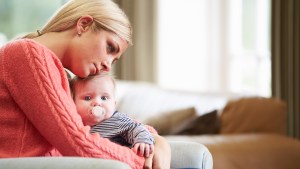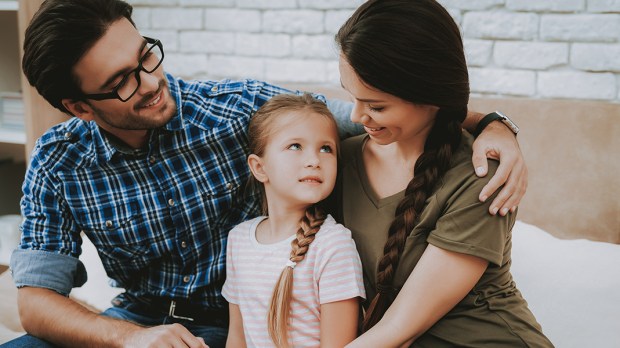Every parent, I suspect, feels some amount of guilt. It’s a phenomenon that isn’t spoken out loud very much, but is nevertheless widespread. I wonder if we’re all walking around all the time feeling guilty but thinking no one else feels the same way.
Guilt is the sort of secret that makes me believe everyone is marveling at what a bad parent I am. All the other parents surely talk among themselves about how my children go up the slides at playgrounds when clearly slides are meant to be gone down, how my children howl like wolves at the moon while dangerously perched 20 feet in the air on the branch of a magnolia tree, and how one of my children somehow made it into Mass with his pants on backwards. A father cannot help but feel somewhat guilty over even these small parenting fails.
I must be the only one whose children act like this. At least, this is how it feels sometimes – that you’re the only one with flaws and every single other parent on the planet is perfect. (Well, almost.) This is part of the guilt trap. It makes us feel uniquely inadequate when, in fact, everyone is in the same boat. Every single parent tortures themselves over choices they’ve made – Was I too strict? Was I too lenient? Did I go back to work too soon? Did I send them to the wrong school? The wrong doctor? Was I a bad example?
Every child is inevitably going to make mistakes. We hope and pray the mistakes aren’t too big and they learn from them in time to become responsible adults. Nevertheless, until it happens to you, it’s hard to shake that new-parent confidence that for your child it’ll be different. Your child will avoid those mistakes. Mistakes are for other people’s kids. But then it happens. Your child gets in trouble at school, or has behavior issues, or drops out of college. Your best efforts weren’t enough. You start asking more hard questions of yourself. Guilt sets in.
The parish that I pastor, Epiphany of Our Lord in St. Louis, is blessed with a large number of young families. There are times during Mass when I can hardly hear myself speak because the children are participating in the Mass with extreme vigor and enthusiasm. They sing off-key alleluias minutes after we’ve stopped singing, turn pages in their missals louder than I’ve ever heard paper sound before, and make mad dashes for the bathroom at random intervals.
Out of the corner of my eye, I see parents one-by-one abandon ship, bundling up toddlers in mid-meltdown and rush them out the aisles, a look of embarrassment on their faces. Parents constantly apologize to me about their children. They feel a certain level of guilt that they’ve disturbed the Mass. My response isn’t to lie and assure them that everything is absolutely, perfectly fine — we all know it isn’t ideal for children to lose it in the middle of Mass. But I do assure them that it’s perfectly natural. Children are learning to participate in the Mass and, as a family, our parish supports them and loves them while they practice.
It isn’t perfect, but it also isn’t anything to feel guilty about, and certainly no apologies are necessary. In any case, what kind of parish family would it be if there weren’t lots of children around livening up our prayers? And, food for thought: which of us adults perfectly participates in the Mass every single time, without a single wayward daydream?
The point is, children are busy growing up. They’re going to be annoying at times, and try our patience, and cause us to react badly. They’re going to make mistakes. Parents also make mistakes. We have bad days. We don’t always know how to solve their problems or how to give them exactly what they need.
Fundamentally, the problem is insolvable. Even aside from specific mistakes I’ve made as a father, I know that every day, I’m not loving them perfectly. I’m not loving them the way they deserve. All I can do is my best, and if I’ve given them my best, there’s no reason to feel guilt. In the end, our children are human beings with their own feelings and ideas. They make their own choices and we cannot take it personally, as if we are somehow to blame every single time the toddler has a meltdown during Mass or the teenager gets in trouble.
In her novel Gilead, Marilynne Robinson writes, “It has been my experience that guilt can burst through the smallest breach and cover the landscape, and abide in it in pools and danknesses, just as native as water.” In other words, if we hold onto guilt for too long, it isn’t healthy. It consumes us. Guilt doesn’t serve much long-term use. It functions quite well in the short term to alert us to a problem, but we must feel the guilt, recognize the mistake, and then turn it into a positive change for the future.
Parenting is an evolving process. Children are complicated. Situations are murky. There isn’t one right answer. I hold onto my faith that God makes all situations profitable, even the painful ones that we’ve brought about by our own mistakes. Everything is a chance to grow and learn, both for parents and children, as long as we don’t allow guilt to sabotage the process.
No one can be an expert all the time about everything. In any case, successful parenting isn’t only about having more information and knowing the latest theories. Parenting is about being a family together, making mistakes together, forgiving each other, and above all loving each other. Where love is, there’s no room for guilt.


